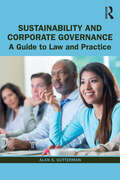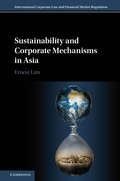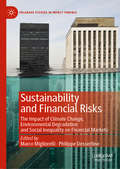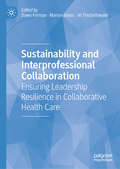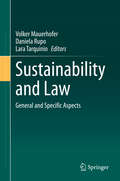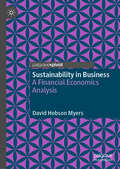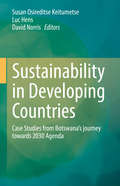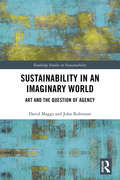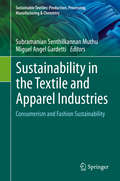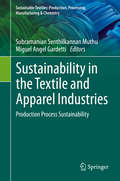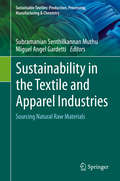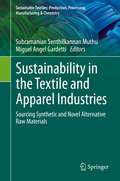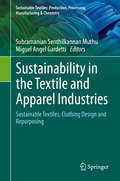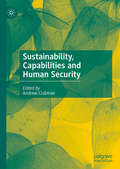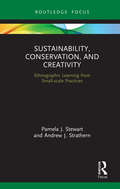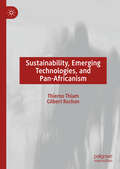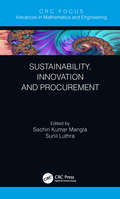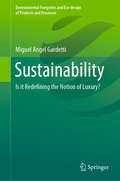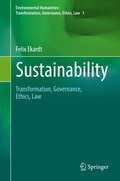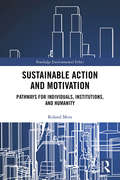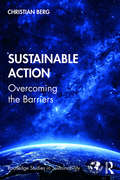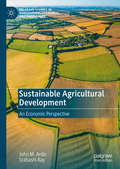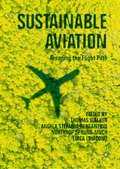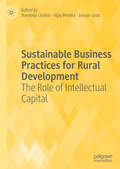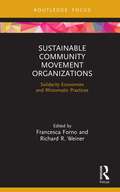- Table View
- List View
Sustainability and Corporate Governance: A Guide to Law and Practice
by Alan S. GuttermanSustainability and Corporate Governance is the first extensive and targeted guide for directors and their legal advisors on creating a governance framework for corporations that integrates all the recognized principles of sustainability now being discussed in boardrooms all over the world. The book provides a step-by-step approach on integrating sustainability principles into the activities of the board of directors including detailed guidance on legal, regulatory and business aspects of organizing and operating board committees and designing the sustainability management unit. Essential topics covered include: • Elements of an effective framework for implementation of sustainability governance, including required policies, procedures and committee charters • Organization of the governing board to effectively address sustainability issues and implement sustainability strategies • Best practices and processes to engage company stakeholders Corporate board members and attorneys will appreciate the book’s practical forms and checklists, complete coverage of all facets of sustainability governance, summaries of relevant international and national guidelines and instruments, and a curated list of samples and case studies from companies all around the world.
Sustainability and Corporate Mechanisms in Asia (International Corporate Law and Financial Market Regulation)
by Ernest LimThis is the first book to provide a comparative and critical analysis of why and how six corporate mechanisms - (1) sustainability reporting; (2) board gender diversity; (3) constituency directors; (4) stewardship codes; (5) directors' duty to act in the company's best interests; and (6) liability on companies, shareholders and directors - have been or can be used to promote sustainability in the four leading common law jurisdictions in Asia (Singapore, Hong Kong, India and Malaysia). A central challenge is, whether and if so, how the corporate mechanisms should be reconceptualised to promote sustainability in an environment that is characterised by controlling shareholders, particularly the government in state-owned enterprises. Because controlling shareholders are the norm for the majority of the world's companies, and state-owned enterprises play a significant role, this book has important insights on the problems and prospects of advancing sustainability in concentrated and mixed ownership jurisdictions.
Sustainability and Financial Risks: The Impact of Climate Change, Environmental Degradation and Social Inequality on Financial Markets (Palgrave Studies in Impact Finance)
by Marco Migliorelli Philippe DessertineDespite growing discussions on the relationship between sustainability and finance, so far little attention has been given to the relation linking sustainability-related risks and financial risks. Climate change, environmental degradation and social inequality, among others factors, may indeed have considerable adverse impacts on financial actors and markets, and even have the potential to harm financial stability. Shedding light on the importance of the nexus between sustainability and financial risks, this book addresses the need for new industry and policy approaches. With insights from a skilled set of scholars in the finance field, this edited collection explores the effects of climate risks on the banking and insurance industries, the problem of stranded assets, the possible corporate risk management frameworks that could be used to control sustainability-related risks, the role of non-financial disclosure in fostering market discipline, and the policy actions needed to integrate sustainability considerations into prudential supervision. Tackling an interdisciplinary topic, this book will appeal to academics and practitioners within the finance, business and sustainability fields.
Sustainability and Interprofessional Collaboration: Ensuring Leadership Resilience in Collaborative Health Care
by Marion Jones Jill Thistlethwaite Dawn FormanThis book is the fourth in the series on leadership, interprofessional education and practice, following on from Leadership Development for Interprofessional Education and Collaborative Practice (2014), Leadership and Collaboration: Further Developments for IPE and Collaborative Practice (2015) and Leading Research and Evaluation in Interprofessional Education and Collaborative Practice (2016). Along with policy changes around the globe, these three books have stimulated experts in this area to consider not only the ways in which they introduce and develop interprofessional education and collaborative practice, but also how they evaluate their impacts. In this 4th book, the focus is on the sustainability of these initiatives, sharing insights into factors that promote sustainability including leadership approaches and organisationsal resilience, as well as frequently encountered difficulties, and ways to overcome them.
Sustainability and Law: General and Specific Aspects
by Volker Mauerhofer Daniela Rupo Lara TarquinioThe book discusses sustainability and law in a multifaceted way. Together, sustainability and law are an emerging challenge for research and science. This volume contributes through an interdisciplinary concept to its further exploration. The contributions explore this exciting domain with innovative ideas and replicable approaches. It combines a variety of authors, from both the public and the private sectors, and thereby guarantees a broad view that enshrines the more theoretical arguments from the academic side as well as stronger practical applicable perspectives. The book provides space for thoughtful expansions of established theories as well as the hopeful emergence of innovative ideas. Moreover, the combination of three to five contributions into the eleven parts respectively aims toward a compression of like minded thoughts. This should lead to an intensification of exchange of viewpoints from different angles on a similar theme. Readers therefore also have the opportunity to concentrate on single chapters, but receive comprised knowledge and a variety of thoughts for new ideas on a particular theme.
Sustainability in Business: A Financial Economics Analysis
by David Hobson MyersThis book provides an approach to sustainable decision-making rooted in financial and economic literature. Financial economic techniques have the power to frame the discussion of sustainability to explain who, how, and why sustainability is a growing phenomenon in business and investing. Financial concepts in a sustainable framework provide a theoretical basis to approach research and business questions on sustainability. The framework provides for a better understanding of the different definitions of sustainability and the role those differences have on decisions that will lead to the future of sustainable business. A future which relies on growth driven by expanding its markets’ reach (demographics), its innovation or creation of new products, and its capital structure (leverage). Third party certification and governmental regulation become the constraints on that growth as well as the proof of sustainable growth. Finally, the ability and methods for investors to support sustainable growth is addressed in a modern portfolio theory analysis.
Sustainability in Developing Countries: Case Studies from Botswana’s journey towards 2030 Agenda
by Susan Osireditse Keitumetse David Norris Luc HensThis book illustrates an alternative approach to ‘state of sustainability’ reporting by presenting cross-sectoral and multi-disciplinary discussions on sustainability issues in the context of a developing country, Botswana. The book volume illustrates how academic publishing can supplement African governments' existing forms of reporting on sustainability by providing on-ground detailed descriptions and experiences relating to achievement of the various sustainable development goals (SDGs). In addition, this process involves, increases and enhances diversity of stakeholders that report on sustainability. Furthermore, the approach resonates with the UN’s recommendation to build local strategies for implementation of the 2030 agenda for sustainable development. Conventional reporting on sustainability by most African countries is an exercise that is customarily the preserve of designated government ministries. While this form of reporting provides a consistent platform for tracking sustainable development goals, it can also benefit from juxtaposition with in-depth descriptions and experiences provided by academic publishing. Academia, through publishing, provides a framework for on-ground situation-analysis as well as in-depth descriptions of African country’s grass-root experiences, thus allowing for temporal tracking of sustainable development milestones. As this volume illustrates, experiences from the various contributors on this volume highlight different points of departure towards achieving the 2030 agenda. Topics covered include biodiversity, water management, world heritage, environment, education, tourism, gender, institutional approaches to achievement of SDGs, as well as contribution of non-governmental organisations (NGO)'s amongst others.
Sustainability in an Imaginary World: Art and the Question of Agency (Routledge Studies in Sustainability)
by John Robinson David MaggsSustainability in an Imaginary World explores the social agency of art and its connection to complex issues of sustainability. Over the past decade, interest in art’s agency has ballooned as an increasing number of fields turn to the arts with ever-expanding expectations. Yet just as art is being heralded as a magic bullet of social change, research is beginning to throw cautionary light on such enthusiasm, challenging the linear, prescriptive, instrumental expectations such transdisciplinary interactions often imply. In this, art finds itself at a treacherous crossroads, unable to turn a deaf ear to calls for help from an increasing number of ostensibly non-aesthetic fields, yet in answering such prescriptive urgencies, jeopardizing the very power for which its help was sought in the first place. This book goes in search of a way forward, proposing a theory of art aiming to preserve the integrity of arts practices within transdisciplinary mandates. This approach is then explored through a series of case studies developed in collaboration with some of Canada’s most prominent artists, including internationally renowned nature poet Don McKay; Italian composer and Head of Vancouver New Music, Giorgio Magnanesi; the renowned Electric Company Theatre, led by Kevin Kerr; and finally through a largescale multimedia installation aiming to reimagine the relationship between climate, culture, and human agency. Sustainability in an Imaginary World will be of great interest to students and scholars of arts-based research fields, sustainability studies, and environmental humanities.
Sustainability in the Textile and Apparel Industries: Consumerism and Fashion Sustainability (Sustainable Textiles: Production, Processing, Manufacturing & Chemistry)
by Subramanian Senthilkannan Muthu Miguel Angel GardettiThis book is part of a five-volume set that explores sustainability in textile industry practices globally. Case studies are provided that cover the theoretical and practical implications of sustainable textile issues, including environmental footprints of textile manufacturing, consumer behavior, eco-design in clothing and apparels, supply chain sustainability, the chemistry of textile manufacturing, waste management and textile economics. The set will be of interest to researchers, engineers, industrialists, R&D managers and students working in textile chemistry, economics, materials science, and sustainable consumption and production. This volume focuses on sustainability aspects of consumerism and fashion, emphasizing the environmental issues that stem from textile care and disposal, and how many of these practices detrimentally impact the environment. Also addressed is the role of consumer knowledge and behavior associated with the clothing industry that may exacerbate these issues, and what can be done to better inform consumers about more sustainable options available to them. The case studies presented cover environmental and social sustainability in the clothing industry, and sustainable development in luxury fashion networks.
Sustainability in the Textile and Apparel Industries: Production Process Sustainability (Sustainable Textiles: Production, Processing, Manufacturing & Chemistry)
by Subramanian Senthilkannan Muthu Miguel Angel GardettiThis book is part of a five-volume set that explores sustainability in textile industry practices globally. Case studies are provided that cover the theoretical and practical implications of sustainable textile issues, including environmental footprints of textile manufacturing, consumer behavior, eco-design in clothing and apparels, supply chain sustainability, the chemistry of textile manufacturing, waste management and textile economics. The set will be of interest to researchers, engineers, industrialists, R&D managers and students working in textile chemistry, economics, materials science, and sustainable consumption and production.This volume addresses the technologies and mechanical processes of textile production, and what sustainable methods can be employed to achieve improved safety and environmental health. The book covers sustainable aspects of printing, dyeing, coloration, weaving, knitting, tailoring, surface design and antimicrobial finishing for environmentally friendly textile and apparel products.
Sustainability in the Textile and Apparel Industries: Sourcing Natural Raw Materials (Sustainable Textiles: Production, Processing, Manufacturing & Chemistry)
by Subramanian Senthilkannan Muthu Miguel Angel GardettiThis book is part of a five-volume set that explores sustainability in textile industry practices globally. Case studies are provided that cover the theoretical and practical implications of sustainable textile issues, including environmental footprints of textile manufacturing, consumer behavior, eco-design in clothing and apparels, supply chain sustainability, the chemistry of textile manufacturing, waste management and textile economics. The set will be of interest to researchers, engineers, industrialists, R&D managers and students working in textile chemistry, economics, materials science, and sustainable consumption and production. This volume comprehensively covers the various sustainable natural materials used in textiles that originate from raw materials sourcing. The book discusses agricultural production systems and standards for the development of sustainable textile fibers, the effects of chemical surface modification methods on the properties of textile fibers, and how antibacterial and antifungal textiles can be manufactured using natural resources.
Sustainability in the Textile and Apparel Industries: Sourcing Synthetic and Novel Alternative Raw Materials (Sustainable Textiles: Production, Processing, Manufacturing & Chemistry)
by Subramanian Senthilkannan Muthu Miguel Angel GardettiThis book is part of a five-volume set that explores sustainability in textile industry practices globally. Case studies are provided that cover the theoretical and practical implications of sustainable textile issues, including environmental footprints of textile manufacturing, consumer behavior, eco-design in clothing and apparels, supply chain sustainability, the chemistry of textile manufacturing, waste management and textile economics. The set will be of interest to researchers, engineers, industrialists, R&D managers and students working in textile chemistry, economics, materials science, and sustainable consumption and production. This volume explores some alternative synthetic raw materials resulting from the recycling and regeneration of renewable textile fibers, and how these sustainable green-based composites can contribute to improved ecological and human health. The book offers insights into the impacts of human-made fibers and microfiber pollution, and how biodegradable material sourcing can help to curb harmful environmental impacts from these practices and achieve clothing and apparel sustainability.
Sustainability in the Textile and Apparel Industries: Sustainable Textiles, Clothing Design and Repurposing (Sustainable Textiles: Production, Processing, Manufacturing & Chemistry)
by Subramanian Senthilkannan Muthu Miguel Angel GardettiThis book is part of a five-volume set that explores sustainability in textile industry practices globally. Case studies are provided that cover the theoretical and practical implications of sustainable textile issues, including environmental footprints of textile manufacturing, consumer behavior, eco-design in clothing and apparels, supply chain sustainability, the chemistry of textile manufacturing, waste management and textile economics. The set will be of interest to researchers, engineers, industrialists, R&D managers and students working in textile chemistry, economics, materials science, and sustainable consumption and production. This volume discusses novel trends and concepts in sustainable textile design, including innovative topics such as doodling and upcycling in clothing and apparel design for sustainable fashion initiatives. Along with strategies for repurposing fashion sustainability, the book also covers university interventions for the development of proper and environmentally friendly design practices. Specific technologies addressed include UV applications, laser treatments for dyeing, refined surface design techniques for products such as leather.
Sustainability, Capabilities and Human Security
by Andrew CrabtreeAmartya Sen and Martha Nussbaum have made major contributions to development studies and social philosophy, yet sustainability issues have largely remained outside their domain despite sustainability’s significance and complex relation to their central value of freedom. This volume explores sustainability from a capabilities perspective, with the motif of human security, inviting a lively discussion within the human development family. After introducing the two approaches, authors conceptualize relationships between capabilities and the environment, examine the scientific and normative validity of environmental indicators and analyse intergenerational justice. Climate change is used to exemplify that a human security approach can add an explanatory ontology to the ethical criticisms of contemporary ways of life that champion consumerism. That ontology recognizes shared life experiences, problems and life challenges - a community of fate. The volume ends with a discussion of how the approaches can inform and sometimes critique the Sustainable Development Goals.
Sustainability, Conservation, and Creativity: Ethnographic Learning from Small-scale Practices (Routledge Focus on Environment and Sustainability)
by Pamela J. Stewart Andrew J. StrathernBy examining how small communities have dealt with forces of change and have sought to maintain themselves over time, this book offers pointers and lessons for conservation practices at all levels of society. "Sustainability" has become an increasingly popular term as a signal of concerns with long-term environmental consequences of human actions. Sustainability as a goal has started to replace "development" as a way of describing policies that go beyond the concept of increasing commercial production or making monetary profits from enterprises. By focusing on topical case histories on agricultural activity, stock-keeping, cash cropping, mining, and renewable energy, the authors highlight how ethnographic studies can and should inform policy decisions at both local and global levels. This book will be of great interest to students and scholars of applied anthropology, sociology, and development studies.
Sustainability, Emerging Technologies, and Pan-Africanism
by Thierno Thiam Gilbert RochonThis book examines the historical antecedents of Pan-Africanism as a driving force of African Unity, carefully studying its major contributors, current institutional status, and potential future growth. It analyzes the facilitative role of emerging technologies, such as high performance computing, telecommunications, and satellite remote sensing in enabling African sustainable development. Finally, the authors discuss possible ways that the vision of Pan-Africanism can be used today in Africa’s efforts towards unity and sustainable development.
Sustainability, Innovation and Procurement (Advances in Mathematics and Engineering)
by Sunil Luthra Sachin Kumar ManglaSustainable procurement is the pursuit of sustainable development objectives through the purchasing and supply process, while balancing environmental, social, and economic objectives. This book will help readers develop new contemporary knowledge about frameworks, innovative tools and techniques to achieve sustainability in public as well as private procurement practices. The book will enable scholars and practitioners working in the domain of sustainable procurement to improve the overall performance of the supply chain and further achieve UN SDGs, by making various decisions at the planning and strategic phase of the business. Features Discusses theoretical, decision making and related business management models Assists to achieve Sustainable Development Goals (SDGs) Provides qualitative/quantitative frameworks Covers quality innovations sustainability in sourcing Examines measurement drivers, indicators and metrics
Sustainability: Is it Redefining the Notion of Luxury? (Environmental Footprints and Eco-design of Products and Processes)
by Miguel Angel GardettiThis book presents and analyzes aspects that, within the framework of luxury, have been or are currently being redefined by sustainability considerations. It also presents and reviews cases from industry and entrepreneurs in connection with this ongoing redefinition process.
Sustainability: Transformation, Governance, Ethics, Law (Environmental Humanities: Transformation, Governance, Ethics, Law)
by Felix EkardtThis book proposes a holistic transdisciplinary approach to sustainability as a subject of social sciences. At the same time, this approach shows new ways, as perspectives of philosophy, political science, law, economics, sociology, cultural studies and others are here no longer regarded separately. Instead, integrated perspectives on the key issues are carved out: Perspectives on conditions of transformation to sustainability, on key instruments and the normative questions. This allows for a concise answer to urgent and controversial questions such as the following: Is the EU an environmental pioneer? Is it possible to achieve sustainability by purely technical means? If not: will that mean to end of the growth society? How to deal with the follow-up problems? How will societal change be successful? Are political power and capitalism the main barriers to sustainability? What is the role of emotions and conceptions of normality in the transformation process? To which degree are rebound and shifting effects the reason why sustainability politics fail? How much climate protection can be claimed ethically and legally e.g. on grounds of human rights? And what is freedom? Despite all rhetoric, the weak transition in energy, climate, agriculture and conservation serves as key example in this book. It is shown how the Paris Agreement is weak with regard to details and at the same time overrules the growth society by means of a radical 1,5-1,8 degrees temperature limit. It is shown how emissions trading must – and can – be reformed radically. It is shown why CSR, education, cooperation and happiness research are overrated. And we will see what an integrated politics on climate, biodiversity, nitrogen and soil might look like.
Sustainable Action and Motivation: Pathways for Individuals, Institutions and Humanity (Routledge Environmental Ethics)
by Roland MeesSustainable Action and Motivation proposes individual competencies and institutional policies that can help overcome the motivational hurdles that hamper sustainable action. Following the Paris Agreement of 2015 and the UN Sustainable Development Goals, the political momentum urgently to begin the drastic reduction of greenhouse gas emissions has increased significantly. Affluent, high-income OECD countries are expected to take the lead in the global transition to a low carbon society. Given this, we need a better understanding of the motivational problems that people in affluent countries face with acting sustainably. This book investigates the above questions by analysing three fundamentally different perspectives: individuals and their motivation to act sustainably; institutions who take responsibility for issuing policies that steer us towards taking sustainable action; and humanity, each individual member of which ought to understand his or her non-sustainable behaviour in relation to the continued existence of the collective of human beings. Using theories from empirical psychology and a phenomenological approach to the research, this book will be of great interest to students and scholars of practical philosophy, psychology of motivation and environmental psychology, as well as policymakers looking for ways to implement effective policies that encourage pro-environmental behaviour.
Sustainable Action: Overcoming the Barriers (Routledge Studies in Sustainability)
by Christian BergIn this timely exploration of sustainable actions, Christian Berg unpacks the complexity in understanding the barriers we face in moving towards a sustainable future, providing solution perspectives for every level, from individuals to governments and supra-national organizations offering a lucid vision of a long-term and achievable goal for sustainability. While the 2030 Agenda has already set ambitious targets for humanity, it offers little guidance for concrete actions. Although much is already being done, progress seems slow and some actions aiming at sustainability may be counterproductive. Different disciplines, societal actors, governmental departments and NGOs attribute the slow progress to a number of different causes, from the corruption of politicians to the wrong incentive structures. Sustainable Action surveys all the fields involved in sustainability to provide action principles which speak to actors of different kinds, not just those professionally mandated with such changes. It offers a road map to all those who might not constantly think about systems change but who are concerned and want to contribute to a sustainable future in a meaningful way. This book will be of great interest to students and scholars of sustainability issues, as well as those looking for a framework for how to change their systems at work to impact the quadruple bottom line: environment, economy, society, and future generations.
Sustainable Agricultural Development: An Economic Perspective (Palgrave Studies in Agricultural Economics and Food Policy)
by John M. Antle Srabashi RayThis book provides a non-technical, accessible primer on sustainable agricultural development and its relationship to sustainable development based on three analytical pillars. The first is to understand agriculture as complex physical-biological-human systems. Second is the economic perspective of understanding tradeoffs and synergies among the economic, environmental and social dimensions of these systems at farm, regional and global scales. Third is the understanding of these agricultural systems as the supply side of one sector of a growing economy, interacting through markets and policies with other sectors at local, national and global scales. The first part of the book introduces the concept of sustainability and develops an analytical framework based on tradeoffs quantified using impact indicators in the economic, environmental and social domains, linking this framework to the role of agriculture in economic growth and development. Next the authors introduce the reader to the sustainability challenges of major agroecosystems in the developing and industrialized worlds. The concluding chapter discusses the design and implementation of sustainable development pathways, through the expression of consumers’ desire for sustainably produced foods on the demand side of the food system, and through policies on the supply side such as new more sustainable technologies, environmental regulation and payments for ecosystem services.
Sustainable Aviation: Greening the Flight Path
by Thomas Walker Angela Stefania Bergantino Northrop Sprung-Much Luisa LoiaconoThis book highlights the latest research in the field of Sustainable Aviation. In recent decades, there have been considerable improvements in aircraft efficiency and noise reduction. However, with the demand for both passenger and freight transportation expected to increase significantly in future years, the aviation sector is becoming a growing source of environmental problems and a major contributor to global warming.Focusing on the need to address this mounting problem, this book discusses important new trends and outlines likely future developments in carbon emission reduction, carbon trading, and the impact of emerging technologies, as well as social, legal, and regulatory changes as they pertain to the aviation sector. The book offers an invaluable reference guide for practitioners, regulators, academics, and students alike, in fields ranging from business and engineering to the social sciences. It can be used as a textbook, and will benefit anyone interested in the future of aviation and our planet.
Sustainable Business Practices for Rural Development: The Role of Intellectual Capital
by Vijay Pereira Hardeep Chahal Jeevan JyotiThe book includes empirical research papers and case studies embracing human capital, relational capital and structural capital in context to services and manufacturing sectors. It will highlight on the sustainable business practices manifested in the work culture, values and beliefs in context to rural regions. From a learning and managerial perspective, the book will identify effective business practices in varied service and manufacturing sectors significant for sustaining business performance and competitive advantage.
Sustainable Community Movement Organizations: Solidarity Economies and Rhizomatic Practices (Routledge Focus on Environment and Sustainability)
by Francesca Forno Richard R. WeinerThis volume shines a light on Sustainable Community Movement Organizations (SCMOs), an emergent wave of non-hierarchical, community-based socio-economic movements, with alternative forms of consumption and production very much at their core. Extending beyond traditional ideas of cooperatives and mutualities, the essays in this collection explore new geographies of solidarity practices ranging from forms of horizontal democracy to interurban and transnational networks. The authors uniquely frame these movements within the Deleuzian concept of the ‘rhizome’, as a meshwork of alternative spaces, paths and trajectories. This connectivity is illustrated in case studies from around the world, ranging from protest movements in response to austerity measures in Southern Europe, to the Buen Vivir movement in the Andes, and Rotating Savings and Credit Associations (ROSCAs) in the Caribbean and Canada. Positioning these cases in relation to current theoretical debates on Social Solidarity Economy, the authors specifically address the question of the persistence and the durability of the organizing practices in community economies. This book will be a valuable tool for academics and students of sustainable consumption, environmental policy, social policy, environmental economics, environmental management and sustainability studies more broadly.
